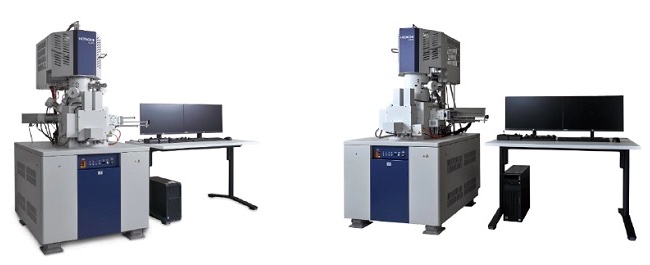Hitachi High-Tech Corporation (“Hitachi High-Tech”) announced today the launch of two cutting-edge FE-SEM(1) models, the SU8600 and SU8700 (hereinafter, “this product line”), that feature new detectors, capabilities, advanced automation, and more. This class of instrumentation is used to observe, measure, define and analyze microstructures across a wide range of fields including semiconductors, life sciences and materials development. To be effective in such fields today, data-driven research and development requiring the acquisition of large data sets is necessary. Therefore, this product line has been designed to support the rapid acquisition of large, high-quality data sets and reduce the effort required by operators through the utilization of next-generation automation.
 |
| Field Emission Scanning Electron Microscope SU8600(Left), SU8700(Right) |
Background in the Development of the SU8600 and SU8700
FE-SEMs in general are powerful instruments that provide not only high resolution images, but also a plethora of analytical, compositional, and morphological information. These SEMs are used in a wide range of fields including nanotechnology, semiconductors, electronics, life sciences, materials science, and more. Thus, with today’s ever expanding application fields, including Materials Integration(2), the need to acquire large amounts of data in a short amount of time with minimal input has become crucial. To address this need, Hitachi has re-envisioned and transformed the implementation of automated functions as well as the design of hardware components in order to support the acquisition of superb data in vast quantities with the utmost efficiency.
Features of the SU8700 and SU8600
The SU8600 utilizes an ultra-stable cold-field emission source to enable exceptional low-energy imaging for fine structural analysis as well as high-resolution observation of beam sensitive materials like polymers. Conversely, the SU8700 employs a Schottky field-emission source to better address analytical requirements requiring high probe currents such as EBSD(3) analysis on ceramics or metals.
This product line has the following key features:
1. Automatic Data Acquisition
Traditionally, FE-SEM operators have been required to change and adjust observation conditions on case-by-case basis according to the object or analytical goal. The amount of time it takes to make these adjustments depends on the operator’s proficiency and can lead to variations in data quality as well as throughput. Both the SU8600 and SU8700 now integrate functionality to automate many of these adjustment processes, creating simple, stable, high-throughput and repeatable operation.
Additionally, as the capability of equipment increases, so does volume of data required and manually collecting these substantial amounts of data can translate to more work for operators.
To address this point, the SU8600 and SU8700 can be equipped with an optional “EM Flow Creator” feature, which enables automatic data acquisition according to user-specific conditions and steps. This allows large-scale data sets to be acquired easily, efficiently, and automatically.
2. More Information = Better Results
A multitude of signals can be obtained from almost any SEM, however, this product line permits the display as well as capture of up to six detector signals simultaneously, allowing operators to collect more information in less time.
Field of view (FOV) is important for maximizing data acquisition and resolution; therefore, the maximum number of pixels has been expanded(4) to 40,960 x 30,720 pixels, which is 64 times that of existing models(5)! This feature enables detailed evaluation of numerous regions of interest and localized microstructures using just a single image.
3. Enhanced Signal Detection Capabilities
New optional detectors have been developed for the SU8600 to enhance the observation of topographical and cathode luminescence information. Also, the response speed of the new backscattered electron detector has been improved to increase throughput.
Also, the SU8700 specimen chamber is structured in such a way that it allows for EDS(6) analysis at a short WD(7), improving the spatial resolution of the technique and making it possible to thoroughly analyze even smaller features with greater comprehension.
Hitachi High-Tech will continue to provide innovative solutions such as this product line for upcoming technology challenges. Furthermore, Hitachi High-Tech will create new social and environmental value by helping our customers be fast-moving, successful in cutting-edge businesses, as well as contributing to cutting-edge manufacturing.
(1) FE-SEM: Field-emission scanning electron microscope
(2) Materials integration: Comprehensive material technologies that use a combination of theory, experiments, data analysis, simulations, and databases to shorten the development time of materials
(3) EBSD: Electron backscatter diffraction. A method used for orientation analysis of crystalline samples
(4) This expansion is an optional feature
(5) Compared to Regulus Series FE-SEMs
(6) EDS: Energy-dispersive X-ray spectroscopy
(7) WD: Working distance
About Hitachi High-Tech
Hitachi High-Tech, headquartered in Tokyo, Japan, is engaged in activities in a broad range of fields, including Analytical & Medical Solutions (manufacture and sales of clinical analyzers, biotechnology products, and analytical instruments), Nano-Technology Solutions (manufacture and sales of semiconductor manufacturing equipment and analysis equipment), and Industrial Solutions (providing high value-added solutions in fields of social & industrial infrastructures and mobility, etc.). The company’s consolidated revenues for FY 2020 were approx. JPY 606.3 billion [USD 5.7 billion]. For further information, visit http://www.hitachi-hightech.com/global/


